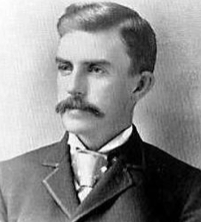Born at Buck Mountain, in Foster Township, Luzerne County, Pennsylvania (near Wilkes-Barre), McGroarty was the youngest of 12 children. He was educated at public schools and Harry Hillman Academy in Wilkes-Barre, and was employed as treasurer of Luzerne County from 1890 to 1893. He later studied law and was admitted to the bar in 1894 and commenced practice in Wilkes-Barre. McGroarty then moved to Montana and was employed in an executive position with the Anaconda Copper Mining Company at Butte and Anaconda from 1896–1901. Afterward he moved to Los Angeles, California in 1901 and engaged in journalism. In 1909, McGroarty edited a LA Times centenary edition of Lincoln’s birth with an introspective on blacks in Los Angeles. He became a “beloved figure in black Los Angeles” for his broad-minded views.[1] McGroarty authored numerous books and dramas, one of his best-known works being The Mission Play (1911), a three-hour pageant describing the California Missions from their founding in 1769 through secularization in 1834, ending with their “final ruin” in 1847. The play opened on April 29, 1912. McGroarty also penned California: Its History and Romance in 1911 and Mission Memories in 1929. In his book the California Plutarch, 1935, he detailed the lives and histories of Northern and Southern California’s early pioneers such as the Crocker, Carrillo, Van Nuys, Stanford, Avila, Estrada, Sepulveda, Baldwin and Mulholland families. Besides, he was also the editor of the The West Coast Magazine for a long time.[2]
McGroarty was designated poet laureate of California by the State legislature in 1933. He was elected to the 74th Congress (January 3, 1935 – January 3, 1937), where he played a large factor in introducing the Townsend Bill to the legislature; McGroarty was reelected to the 75th Congress (January 3, 1937 – January 3, 1939), but was not selected as a candidate for renomination in 1938; he was also unsuccessful at securing the Democratic nomination for Secretary of State of California that same year. After his brief stint in politics, McGroarty resumed the profession of journalism in Tujunga, California. McGroarty died in St. Vincent’s Hospital in Los Angeles, California on August 7, 1944, at the age of 81, and was interred at Calvary Cemetery.
He lived in Sunland, California, in a house he built himself and completed in 1923, known as Rancho Chupa Rosa. The building is now Historic Cultural Monument No. 63 of the City of Los Angeles and is known as the McGroarty Arts Center. It offers instruction in art, music and performance and hosts cultural events.

